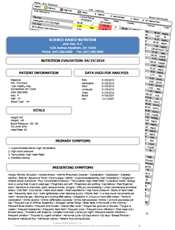Diabetes has become a silent, modern epidemic as it’s already the 6th leading cause of death among Americans and the fastest growing disease in every age group…even children.
Glucose-regulating medications come with numerous side effects such as muscle pain, trouble breathing, stomach pain, changes in heart rate and even rapid weight gain. Can you imagine what a lifetime of drug therapy will do to these children? How will their medication use affect future generations?
The tragedy is that in most cases, this disease is entirely preventable with proper awareness, testing, diet and exercise. Yet it’s estimated that 5 million people are unaware of their abnormal glucose or hemoglobin A1C levels. Could you be one of them?
The cause of elevated glucose levels could be many things. Poor diet, medications, liver disease, mineral deficiencies, toxic elements, chronic infections and digestion problems can all be contributors. This is why it is essential to do proper testing to assess all aspects of your health.
Diabetes increases the risk of heart disease, stroke, and loss of nerve function which can lead to the need for amputation. Because of this, medications are frequently used to reduce glucose levels in your blood stream.
But the most important question to ask when medication is used is this: Where does the glucose go when it is lowered from say 300 down to 120? The Glucose is not eliminated or destroyed. It is forced into other cells, such as the eyes and kidneys, where it continues to do damage causing kidney disease, and even vision disturbances or blindness.


